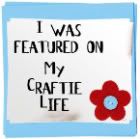I often wonder if I were from a different era would I have chosen to become a Nurse. To be honest, becoming a Nurse wasn't really on my radar while attending High School. When it came time to apply to colleges and universities I was clueless as to which career path I wanted to take. A good friend from High Shool had decided she was going to apply to Nursing school. So I said to myself, " What the heck, I 'll apply too. At least we could sit together if we both got accepted." Fast forward 13 years and I've been a Registered Nurse for 9 years. She dropped out after the first semester. (Nursing is definately not for everyone)
♥Right now there is a nurse helping a woman become a mom, a nurse holding the hand of a dying man, a nurse inserting an IV in a child, a nurse listening to an alzheimers patient tell a story of long ago, a nurse missing their family while caring for yours. In the minute it took you to read this, nurses all over the world are touching lives. Thank a nurse! HAPPY NURSES WEEK May (6-12) to all my fellow nurses!!!♥
I consider it a privilege to be reponsible for all these different duties. I take great interest in studying the different roles and duties of a Nurse over the last century. Many people are not aware of the many advances in Nursing over the past 100 years. From basic bedside care and applying leeches to a myriad of contributions. Modern day Nurses are responsible for guiding patients through the complexities of the health care system, shaping policies that protect people from disease and promote health, advocating for patient safety and quality of care and driving important innovations in research.
I would love to share with you some of many changes seen in the Nursing profession over the past 100 years. I think it will give you a better understanding as to how much the profession has evolved.
1900's Nursing Duties
At the turn of the century nurses would have spent much of their time sterilizing equipment and applying leeches. She (I say "she" because the professsion at this time was exlusively women) had to make and stock thousands of sponges, wipes and bandages. She prepares all the water that would be used by boiling and filtering it three times. Then she bottled it; she sterilizes sutures and ligatures; keeps the instruments bright and clean; and is responsible for the perfect cleanliness of the operating room. Her role revolved mainly around houskeeping duties. Her wage was about $5/week-barely enough to live on.
1920's Nursing Duties
A nurses duties evolved from mostly private homecare and housekeeping duties to caregiving responsiblities. Giving baths, inserting catheters, administering enemas and medications, dressing wounds and sores, and generally monitoring patients’ appearance.
Even though the role of the nurse changed the wage was still very low, averaging about 50 cents/hour.
At this time hospitals were no longer being reserved for the indigent and dying but they were becoming mainstream institutes for the middle class to seek treatment and childbirth assistance. This added to the need for additional nurses.
World War II
This is a pivotal time in the nursing profession because as nurses joined the war effort they were taken out of hospitals and placed directly at the bedside of patients. For the first time nurses were being allowed to make decisions based on their judgements and dealing with the consequences.
After the war had ended nurses returned armed not only with solid public support, but with new skills. The military had trained nurses in specialties such as anesthesia and psychiatric care, and offered valuable hands-on experience that would ultimately broaden the scope of the profession for future generations.
1960's and After
With the development of the ICU in the 60's once again the role of a nurse had evolved. Cutting edge technology used to treat critically ill patients demanded a higher level of training. This drove specialization within the nursing profession and advanced degrees were soon required. At this time we begin to see nurses actually practicing medicine. For the first time they were responsible for taking blood pressures, reading and interpreting heart monitors, monitoring and reporting on critically ill patients, and attending to high tech machines.
The average yearly wage for a nurse at this time was around $5,200/year.
Today
Between 1980-1990 nurses were no longer required to wear dressses, stockings and the iconic pillbox nursing hat. Some nurses welcomed the much more user friendly scrub suit and disposable gloves and gowns. Today the profession is no longer exlusively women. Today Nurses are responsible for taking on technologically challenging roles. We even see some nurses taking over roles once reserved for physicians (ie Nurse practioners, Nurse Midwifes)
Above all else, one of the biggest changes in the profession is that today's Nurse is now respected as being part of the health care team responsible for delivering excellent patient care.
Today there are Nurses who work in speciality areas such as Geriatrics(elderly),OR (operating room) , Medical-Ssurgical , Labor and Delivery, Pediatric, ICU, ER and even Psychiatrics. From the time modern day Nurses graduate until they retire they are responsible for ongoing education and increasing clinical experience and skills.
Despite all these changes, Nurses continue to be the heart and soul of medicine.
Each year between May 6-12 (ending on Florence Nightengale's birthday) we set aside a time to thank or pay tribute to the nurses across our country and around the world.
It is a time to thank those men and women who sat holding your grandpa's hand as he took her last breath.
To acknowlege the nurse who placed your precious baby in your arms. A time to honour the nurses who delivered chemotherapy treatment to your mom who has breast cancer. A time to thank that nurse who helped your son breath during a middle of the night asthma attack. A time to thank those nurses who went to work so bravely during the SARS crisis or H1N1 outbreak.
I could go on forever because Nurses help so many people in so many ways.
This week is a great opportunity to recognize Nurses but really we should be thanking the many nurses who care for us or our loved ones each and every time we come in contact with them.
So, the next time you see a nurse out in the community or at a hospital take a second to say thanks. Trust me, we don't hear it nearly enough!
































1 comments:
Nurses have the opportunity to heal the heart, mind, soul and body of patients.
They may forget your name, but they will never forget how you made them feel.
Maya Angelou
Happy Nurses Week and Thank You!
Post a Comment